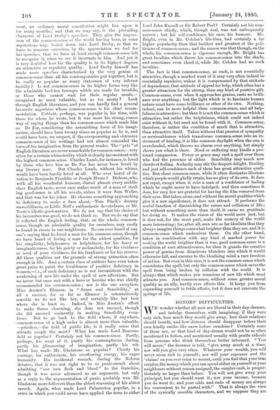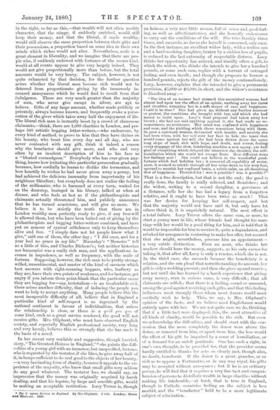DONORS' DIFFICULTIES.
WE wonder whether all men are liberal in their day-dreams, and indulge themselves with imagining, if they were only rich, how much they would give away, how their relations should benefit, and how distress should disappear before their own kindly smiles like snow before sunshine ? Certainly some of them are, or that kind of day-dream would not be so often mentioned in fiction, and mentioned usually with gentle ridicule from persons who think themselves better informed. " You will never," the dreamer is told, "give away much at a time, nor will you give very often. Whatever your wealth, you will never seem rich to yourself; nor will your expenses and the `claims' on you ever cease to mount, until you find that your true surplus, the money which you can spend either on yourself or your neighbours without reason assigned, the surplus cash, is propor- tionately no larger than before. You will not give away your principal, lest you should want it; nor your income, because you do want it ; and your odds and ends of money are always too convenient to be parted with." That is always the view of the cynically sensible characters, and we suppose they are
in the right, so far as this,—that wealth will not often modify character, that the stingy, if suddenly enriched, would still keep their money, and that the liberal, if made wealthy, would still observe the same proportion between their gifts and their possessions, a proportion based on some idea in their own minds which riches would not alter. Nevertheless, scale is a great element in liberality, and we imagine that there are peo- ple who, if suddenly endowed with fortunes of the secure kind, would at all events appear to give very largely indeed. They would not give proportionally more than before, but the total amounts would be very heavy. The subject, however, is not quite exhausted by that decision, for the further question arises whether the liberal man become rich would not be -deterred from proportionate giving by the immensely in- creased annoyances which he would find to result from that indulgence. These are very much greater than the majority .of men, who never give except in silver, are apt to believe. Gifts of any large amount, whether made publicly or privately, always become known, and frequently evoke a perse- cution of the giver which takes away half the enjoyment of life. The liberal rich man is instantly beset by a crowd of clamorous claimants,—think, there are 1,000 charities in London, and per- haps 500 artistic begging letter-writers,—who endeavour, by every kind of method, to prove to him that they have claims on his bounty, who beset him every day and all day, who are never contented with any gift, think it indeed a reason why the benefactor should give more, and who end very often by an insolent description of him to his face as a "bloated curmudgeon." Everybody who has ever given any- thing, knows how irritating this particular persecution gradually becomes, how cordially he learns to dislike the tormentor, and how heartily he wishes he had never given away a penny, but had achieved the delicious immunity from importunity of his neighbour Skinflint; but everybody does not realise the feeling of the millionaire, who is harassed at every turn, waited for -on the doorstep, besieged in his library, talked at when at dinner, and who feels at last as if the philanthropists and claimants actually threatened him, and publicly announces that he has turned avaricious, and will give no more. We believe it to be strictly the truth that there are in London wealthy men perfectly ready to give, if any free-will is allowed them, but who have been baited out of giving by the philanthropists and begging letter-writers combined, and have put on armour of cynical selfishness only to keep themselves .alive and free. "I simply dare not let people know what I give," said one of them, the other day ; " I did once, and for a year had no peace in my life." Macaulay's " Memoirs " tell us a little of this, and Charles Dickens's ; but neither historian nor humourist was a really rich man, and the applications in- crease in impudence, as well as frequency, with the scale of fortune. Supposing, however, the rich man to be pretty strong- willed, unsentimental, and master of the kind of sarcasm which best answers with right-meaning beggars, who, leathery as they are, have their own points of weakness, and for instance, get angry if you inform them point-blank that the particular cause they are begging for—say, teetotalism—is an incalculable evil, there arises another difficulty, that of inducing the people you want to help to accept anything. Many people believe this the most insuperable difficulty of all, believe that in England a particular kind of self-respect is so ingrained by the national sentiment in favour of individualism, that unless the relationship is close, or there is a quid Iwo quo of some kind, such as a great service rendered, the good m, ill not receive gifts. Mrs. Oliphant, who must have observed English society, and especially English professional society, very long and very keenly, believes this so strongly that she has made it the basis of a novel.
In her recent very readable and suggestive, though hurried, story, " The Greatest Heiress in England,"* she paints the diffi- .culties of a young girl with an immense, but unspecified, fortune, who is requested by the testator, if she likes, to give away half of it, in lamps sufficient to do real good to the objects of her bounty, —a very fascinating form of charity, because it appeals to the ex- perience of the majority, who know that small gifts very seldom do any good whatever. The testator has, we should say, an impression that the money was originally acquired by harsh dealing, and that his legatee, by large and sensible gifts, would be making an acceptable restitution. Lucy Trevor is, though
• The C want Heiress in England. By Mrs Oliphant. 3 vols. London: Hurst and Blach ett. 1880.
an heiress, a very nice little mouse, full of sense and good-feel- ing, as well as affectionateness, and she honestly endeavours to carry out the conditions of the will. She tries frankly three times, and succeeds, as far as she herself is concerned, only once. In the first instance, an excellent widow lady, with a useless sou and a hard-working daughter, beaten by a sudden loss of pupils, is reduced to the last extremity of respectable distress. Lucy thinks her opportunity has arrived, and timidly offers a gift, to which the widow, who thinks she intends to give her a hundred pounds, or some such sum, replies with a torrent of outraged feeling, and even insult ; and though she proposes to borrow a. hundred pounds, rejects the gift of the money contumeliously. Lucy, however, explains that she intended to give a permanent provision, £5,000 or £6,000, in short, and the widow's resistance is dissolved away :-
" The idea of an income had stunned this astonished woman, had almost had upon her the effect of an opiate, soothing away her cares and troubles, wrapping her in a soft stupor of ease and happiness. Could it be true ? She had given up, without any further murmur or protest, the conditions she brought with her, and which she had meant to insist upon. Lucy's final proposal had taken away her breath ; she had not said anything against it, she had made no re- monstrance, no resistance. Her mind was confused with happiness and ease, and the yielding which these sensations bring with them. So poor a careworn woman, distracted with trouble and anxiety she had been when, with her veil over her face to hide the tears that would come against her will, she had been driven down the same long slope of road, sick with hope, and doubt, and terror, feeling every stoppage of the slow, lumbering machine a now agony, yet half glad of everything which delayed the interview she dreaded, the self- humiliation which she could not escape from. How different were her feelings now ! She could not believe in the wonderful good- fortune which had befallen her ; it removed all capability of resist- ance, it seemed to trickle through all her veins down to her very feet, upward to nourish her confused brain, a subtle calm, an all-dissolving dew of happiness. Provided for ! was it possible? was it possible ?"
That is a fine description, but that is not the end ; the good is really done, the family is really relieved, and flourishes ; and the widow, writing to a second daughter, a governess at a distance, tells her she has had a legacy from a forgotten relative, and it ought to have been twice as much ! That was her device for keeping her self-respect, and but that the majority would not have said it, but only have let others think it, it is exquisitely natural. The next effort is a total failure. Lucy Trevor offers the same sum, or more, to start a young man in life, whose friends had thought his mar- riage with her would be a good thing for him, and is told that it would be impossible for him to receive it, quite a degradation, and rebuked for arrogance in venturing to make her offer, but assured that she might, nevertheless, procure him an appointment— a very subtle distinction. Even an aunt, who thinks her nephew should have the money, suggests, as his only excuse for taking it, that after all, Lucy is only a trustee, which she is not. In the third case, she succeeds because the beneficiary is a relation, and she can plead that notwithstanding its amount, ht‘r gift is only a wedding present; and then she gives up and marries, but not until she has learned by a harsh experience that giving away money, even in serious sums, is very difficult ; that all claimants are selfish ; that there is a feeling, sound or unsound, among the good against receiving such gifts, and that this feeling influences most strongly those whom most donors would most cordially wish to help. This, we say, is Mrs. Oliphant's opinion of the facts, and we believe most Englishmen would entirely agree with her. We are not quite sure we do, thinking that if a little tact were displayed, this, the most attractive of all kinds of charity, would be possible to the rich. But even we acknowledge the difficulties, and should start with the con- cession that the more completely the donor were above the donee, or removed from him, or apart from him, the less would the effect of his gift be impaired by a sense of humiliation, or of a demand for an unfelt gratitude. One has such a right, in one's own thought, to be provided for, that the provider seems hardly entitled to thanks for acts so clearly just, though also, no doubt, beneficent. If the donor is a great grandee, or so rich as to appear a Fortunatus, or in any way royal, his gifts may be accepted without annoyance ; but if he is an ordinary person, he will find that it requires a very fine tact and compre- hension of persons to distribute wealth in large charities without making life intolerable,—at least, that is true in England, though in Catholic countries feeling on the subject is less morbid, and the " benefactor " held to be a more legitimate subject of admiration.



































 Previous page
Previous page